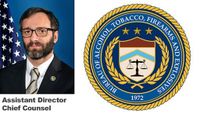The Bureau of Alcohol, Tobacco, Firearms and Explosives (ATF) has appointed Robert Leider, PhD, as the new Assistant Director/Chief Counsel, bringing an extensive background in law and a history of engagement in Second Amendment issues to this pivotal role.
Prior to this appointment, Leider was an Associate Professor at Antonin Scalia Law School at George Mason University, where he taught criminal law and torts. His expertise encompasses a wide range of legal topics, including criminal law, criminal procedure, and constitutional law, with particular emphasis on self-defense laws and gun control. He has made significant scholarly contributions, publishing in journals such as the Florida Law Review and the Indiana Law Journal, and has also written for major publications like The Wall Street Journal.
Leider's professional journey includes prestigious positions at renowned law firms like Arnold & Porter in Washington, DC, and Mayer Brown LLP. His judicial credentials are equally impressive, having clerked for Judge Diane S. Sykes of the U.S. Court of Appeals for the Seventh Circuit and for Supreme Court Justice Clarence Thomas.
Among his notable works is a December 2024 column titled “Analysis: Gun-Rights Advocates Would Benefit More From ATF Reform Than the Agency’s Elimination,” published in The Reload. In this article, he articulated a perspective on the ATF, stating, “Instead of using their political capital to try and dismantle the ATF, gun advocates would likely see more success working within the system. While federal firearms laws cannot be repealed by executive action, they still delegate significant power to the Attorney General (who subdelegates to ATF) on how the laws are implemented.” This indicates his understanding of the potential for reform within the agency rather than total dismantling.
Leider's appointment comes in light of significant changes within the agency. His predecessor, Pamela Hicks, was dismissed on February 20, 2025, by Attorney General Pam Bondi. Hicks, who had served as ATF’s Chief Counsel since 2021 under the Biden administration, was previously Deputy Chief Counsel during the first Trump administration. Her departure has sparked a critical evaluation of the direction the ATF will take under new leadership.
The timing of Leider's ascension to this key position aligns with a growing impatience among gun owners, who feel their rights have been undermined and ignored in recent policy discussions. In a political climate where the Second Amendment is often overshadowed by other issues, the change in leadership at the ATF could signal a renewed focus on gun rights. As noted by William Kirk, President of Washington Gun Law, “Leider is well on record as a staunch, staunch supporter of the Second Amendment.”
The political implications of Leider’s appointment cannot be overlooked. AG Pam Bondi’s polarizing stance on gun rights contrasts sharply with the expectations of many within the Second Amendment community. Despite concerns about her history, the appointments being made within the ATF, including Leider’s, are seen by some as promising steps toward aligning the agency’s focus with more pro-gun beliefs and actions. Kirk remarked, “These people were targeting gun owners–not going to happen under this administration.” The sentiment within the gun rights community suggests a cautious optimism that the agency could shift to prioritizing the constitutional rights of gun owners.
Looking forward, Leider is perceived to be in a position where he can significantly influence ongoing ATF litigation and future actions against perceived violations of gun rights. “If I were in charge of meeting that challenge head-on, hiring someone like Robert Leider might be at the top of my to-do list,” said Kirk, highlighting the expectation for Leider to champion the agency's role in protecting the Second Amendment.
While many gun owners approach this leadership transition with a mix of hope and skepticism, calls for reform within the ATF emerge as an avenue for addressing concerns over the agency's past actions. This perspective hinges upon the necessity for the ATF to transform its mission, focusing on defending constitutional rights rather than imposing additional regulations that gun owners see as infringements.
Legal experts and organizations advocating for Second Amendment rights have expressed excitement over Leider's appointment, seeing it as an opportunity for meaningful reform within the agency. However, the broader challenges faced by the gun rights community remain. Ultimately, substantial changes may require Congressional action to amend laws that many view as unconstitutional.
Thus, while recognizing the incremental changes represented by Leider's and other appointments in this administration, the path towards restoring the Second Amendment will likely require a multifaceted strategy with active participation from various stakeholders. As this story unfolds, observers will be watching closely to see how Leider and the current administration navigate the complex landscape of gun rights and regulations.


